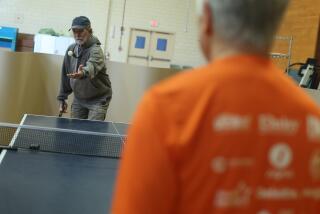Vietnam Veterans--a Premature Death?
- Share via
Vietnam veterans have an increased risk of premature death, particularly from suicide and motor vehicle accidents, compared to men who did not serve in the military, according to a study of the Selective Service lottery of the early 1970s.
Compared to non-veterans, Vietnam veterans may be 86% more likely to die from suicide and 53% more likely to die from motor vehicle accidents, physicians at the UC Medical Center in San Francisco reported.
The report documents in Vietnam veterans the magnitude of the so-called post-traumatic stress disorder, which includes a variety of psychological and health-related problems that have been linked to wartime military service.
The study, in identifying a large group of men at risk for premature deaths, suggests that many such deaths can be prevented. The study was published today in the New England Journal of Medicine.
The researchers could not say how military service caused the high mortality, but suggested that psychological and economic problems, alcohol and drug use, war injuries and familiarity with firearms may have played a role.
Previous studies have shown increased rates of suicide and death from motor-vehicle accidents among Vietnam veterans. But the UCSF study is the first to randomly compare veterans with non-veterans.
“This is the first study that shows a clear cause and effect relationship,” said Dr. Norman Hearst, the principal author of the study.
The researchers examined the deaths of 14,145 men in California and Pennsylvania who had been eligible in 1970-72 for the draft lottery. They then divided the men into two groups--those who were drafted and those who were not.
When the two groups were compared, it turned out, the group which had been drafted had 205 excess deaths after they returned to civilian life.
This finding would project on a national basis to 1,250 excess deaths among the 5.2 million men who were born in 1950-52 and thus involved in the lottery between 1970-72, according to Hearst and his fellow researchers, Drs. Thomas B. Newman and Stephen B. Hulley.
“The earlier years of the draft may have caused thousands of additional premature deaths,” they added.
A national lottery to determine who should be drafted was begun in 1970 and young men were randomly assigned numbers based on their birth dates. The lower his number, the more likely he was to be drafted. Not everyone who was assigned a number was drafted.
In the UCSF study, the group with birth dates that made them eligible for the draft had a 4% higher mortality rate than the group with birth dates that exempted them from the draft, according to the report. Suicide was increased by 13% and deaths from motor vehicle accidents by 8%.
But because only a quarter of those who were eligible for the draft actually served in the military, the researchers had to do further analyses to show that the actual risk factor for premature death was military service, not draft eligibility.
Draft Lottery Status
“These men were equal in every other way, except for their draft lottery status,” Hearst said. “The difference in their mortality rates must be a direct result of the draft lottery.”
In an editorial about the study, Dr. Lawrence C. Kolb, a Glenmont, N.Y., psychiatrist, said post-traumatic stress disorder is common among Vietnam veterans who seek medical help for anxiety or depression. “There is usually a history of insomnia,” he wrote. “The critical diagnostic feature is the occurrence of repetitive nightmares of catastrophic experiences.”
Four million Americans served in Indochina during the Vietnam War and 800,000 were assigned to combat. A total of 57,702 were killed in Southeast Asia and 153,303 were wounded.
More to Read
Sign up for Essential California
The most important California stories and recommendations in your inbox every morning.
You may occasionally receive promotional content from the Los Angeles Times.










